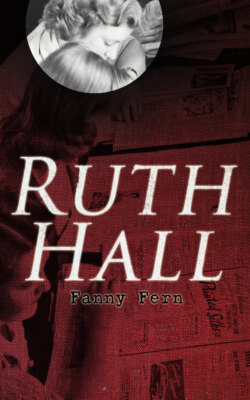Читать книгу Ruth Hall - Fern Fanny - Страница 26
На сайте Литреса книга снята с продажи.
CHAPTER XXIII.
ОглавлениеTable of Contents
“There can be no sorrow greater than this sorrow,” sobbed Ruth, as the heavy sod fell on Daisy’s little breast.
In after years, when bitterer cups had been drained to the dregs, Ruth remembered these, her murmuring words. Ah! mourning mother! He who seeth the end from the beginning, even in this blow “remembered mercy.”
* * * * *
“Your daughter-in-law is quite crushed by her affliction, I hear,” said a neighbor to old Mrs. Hall.
“Yes, Mrs. Jones, I think she is,” said the old lady complacently. “It has taken right hold of her.”
“It died of croup, I believe,” said Mrs. Jones.
“Well, they say so,” said the old lady. “It is my opinion the child’s death was owing to the thriftlessness of the mother. I don’t mourn for it, because I believe the poor thing is better off.”
“You surprise me,” said Mrs. Jones. “I always had the impression that young Mrs. Hall was a pattern mother.”
“People differ,” said the old lady, raising her eyebrows, compressing her lips, and looking mysteriously at the ceiling, as if she could tell a tale, were she not too charitable.
“Well, the amount of it is,” said the garrulous old doctor, emerging from the corner; “the amount of it is, that the mother always thought she knew better than anybody else how to manage that child. Now, you know, Mis. Jones, I’m a physician, and ought to know something about the laws that govern the human body, but you’ll be astonished to hear that she frequently acted directly contrary to my advice, and this is the result; that tells the whole story. However, as Mis. Hall says, the child is better off; and as to Ruth, why the Lord generally sends afflictions where they are needed;” and the doctor returned to his corner.
“It looks very lonely at the Glen since they moved away,” remarked Mrs. Jones. “I suppose they don’t think of coming back.”
“How?” replied the doctor, re-appearing from his corner.
“I suppose your son and his wife have no idea of returning to the Glen,” said Mrs. Jones.
“No—no. Ruth is one of the uneasy kind; it’s coming and going—coming and going with her. She fancied everything in doors and out reminded her of Daisy, and kept wandering round, trying to be rid of herself. Now that proves she didn’t make a sanctifying use of her trouble. It’s no use trying to dodge what the Lord sends. We’ve just got to stand and take it; if we don’t, he’ll be sending something else. Them’s my sentiments, and I consider ’em scripteral. I shouldn’t be surprised if Harry was taken away from her;—a poor, miserable thing she’d be to take care of herself, if he was. She couldn’t earn the salt to her porridge. Thriftless, Mis. Jones, thriftless—come of a bad stock—can’t expect good fruit off a wild apple tree, at least, not without grace is grafted on; that tells the whole story.”
“Well; my heart aches for her,” said the kind Mrs. Jones. “Mrs. Hall is very delicately organized,—one of those persons capable of compressing the happiness or misery of a lifetime into a few moments.”
“Stuff,” said the doctor, “stuff; don’t believe it. I’m an example to the contrary. I’ve been through everything, and just look at me;” and the doctor advanced a pace or two to give Mrs. Jones a better view of his full-blown peony face, and aldermanic proportions; “don’t believe it, Mis. Jones; stuff! Fashion to be sentimental; nerves a modern invention. Ridiculous!”
“But,” said the persistent Mrs. Jones, “don’t you think, doctor, that—”
“Don’t think anything about it,” said the doctor. “Don’t want to hear anything about it. Have no patience with any woman who’d let a husband sell a farm at such a sacrifice as Harry’s was sold, merely because there was a remote chance she would become insane if she staid there. Now, I’ve enough to do—plenty to do, but, still, I was willing to superintend that farm a little, as my doing so was such a help to Harry. Well, well; they’ll both go to the dogs, that’s the amount of it. A rolling stone gathers no moss. Harry was good for something before he married Ruth; had a mind of his own. Ruth aint the wife for him.”
“He did not appear to think so,” replied the obstinate Mrs. Jones. “Everybody in the village says, ‘what a happy couple they are.’”
“O-o-h—my!” hissed the old lady, “did you ever, doctor? Of course, Mrs. Jones, you don’t suppose Harry would be such a fool as to tell people how miserable he was; but mothers, Mrs. Jones, mothers are keen-sighted; can’t throw dust in a mother’s eyes.”
“Nor in mine,” retorted the independent Mrs. Jones, with a mock courtesy to the old lady, as she walked out the door, muttering as she went down the road, “Sally Jones will tell her the truth if nobody else will.”
“Mis. Hall,” said the doctor, drawing himself up so straight as to snap off his waist-band button, “this is the last time that woman ever crosses my threshold. I shall tell Deacon Smith that I consider her a proper subject for church discipline; she’s what the bible calls ‘a busy body in other men’s matters;’ a character which both you and I despise and abominate, Mis. Hall.”
